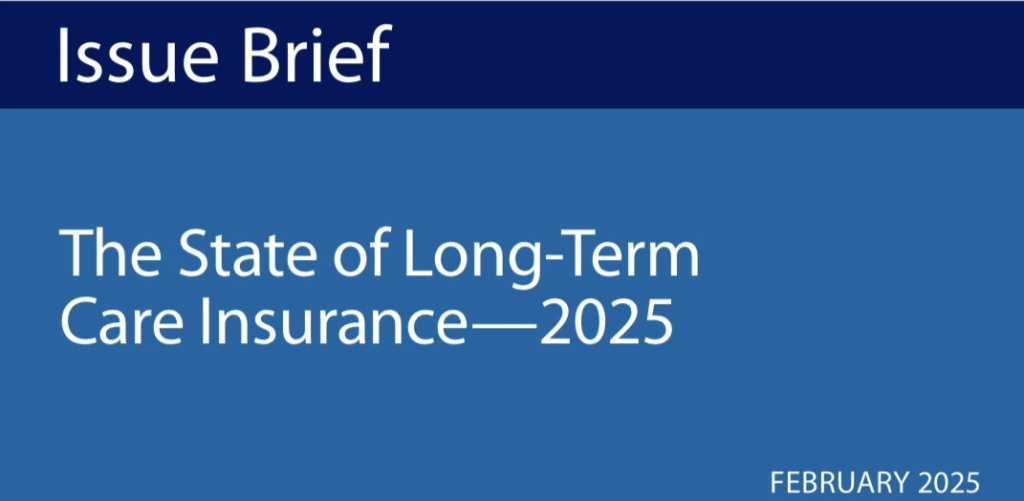Issue Brief, Webinar Examine State of LTC Insurance
A new Long-Term Care (LTC) Committee issue brief highlights the current state of long-term care insurance (LTCI). It focuses on policy design, the management of legacy blocks of business, policyholder engagement, and considers potential areas for continued uncertainty.
For a growing population of older Americans, “hybrid” products-which combine life or annuity products with LTCI coverage-play a significant role in the marketplace along with traditional standalone LTCI products.
Both products may address concerns involving people who pay for but never use benefits. Another alternative, short-term care, offers up to 12 months of coverage and appears to be on the rise.
Of note in the issue brief:
- The U.S. has a rapidly aging population-all of the baby-boomer generation will be 65 or older in 2030.
- The need for LTC services among those 65 and older is somewhere in the 70 percent range.
While LTCI covers the costs of long-term care services and supports (LTSS), which can include skilled nursing, assisted living facility, and home-based care, it is not traditional health insurance.
However, it may be used both to cover care costs and protect beneficiaries’ assets. Like many other insurance products, affordability and the rising cost of health care requires insurers, regulators, and others to work together to improve consumer literacy and understand the available coverage options.
LTCI Webinar
In tandem with the issue brief’s release, the Health Practice Council (HPC) held a Feb. 13 webinar on the future of LTCI. Committee member Steve Schoonveld led a conversation with Connecticut’s Assistant Deputy Commissioner of Insurance, Paul Lombardo, along with committee Vice Chairperson Aaron Wright and member Laurel Kastrup.
“LTCI product innovation will likely move toward care integration,” Steve Schoonveld said in an interview following the webinar. “We currently have silos of supports, with acute care, primary care, and long-term custodial care [that are] not well integrated.”
He said a more coordinated approach to LTC could “come from public and private collaborative approaches brought ‘up-stream’ from the dual-eligible populations. Or, it may be a result of state or federal initiatives that encourage a new and innovative market for LTC insurance solutions for middle-income populations.”
Speaking after the webinar, Dalton noted the growing role of caregivers. “There seems to be an emerging market for insurance products in this space; i.e., insurance products that pay benefits directly to caregivers, rather than those receiving care, to cover lost income … if they need to leave work to care for an elderly loved one,” he said.
Watch a replay on Academy Learning.
Cross-Practice ‘Hill Visits’ to Include Key Health Issues
 HPC volunteers at last year’s Hill visits
HPC volunteers at last year’s Hill visits
The Academy will hold its annual “Hill Visits” this spring. As in past years, a designated cohort of active volunteers will head to Capitol Hill in Washington, D.C., on April 2-4 to meet with federal lawmakers and Congressional staff.
This year’s visits will be slightly different, with 2025 being a joint practice council event. Volunteers from all five Academy practice councils, including the HPC, will visit Senate and House congressional offices. Focusing on key committees and staff, the meetings will spotlight the Academy’s key public policy and professionalism issues.
The Academy will focus on issues including aging and financial security, artificial intelligence and data, and access to and affordability of insurance. Specifically within health, conversations will likely focus on the individual and small group insurance markets, the Affordable Care Act (ACA), LTC insurance, public programs such as Medicare and Medicaid, and the drivers behind rising health cost trends, including prescription drug costs.
The meetings serve as a great reminder to elected officials and their staff of the expertise that the Academy and our volunteers bring to public policy discussions. Actuaries are a necessary and trusted resource, particularly as Congress evaluates and considers proposals to solve some of the nation’s biggest challenges in health and other practice areas.
Contingencies, Actuary Voices Spotlight Senior Fellows on What’s Ahead in 2025
Health-Related Issues Include ACA, Medicare, Long-Term Care
Academy senior fellows, including Health Senior Fellow Cori Uccello, are spotlighted in the January/February Contingencies, highlighting key issues to look forward to in 2025. Uccello discusses the ACA, which turns 15 this year; highlights related ACA work that’s been done and continues by the HPC’s Individual and Small Group Markets Committee; Medicare and LTC; and the cost of prescription drugs.
Actuary Voices Spotlights Senior Fellows
A related Actuary Voices episode features interviews with Uccello, along with Academy Senior Casualty Fellow Rich Gibson and Senior Retirement Fellow Linda K. Stone. The three outlined some of the Academy’s public policy priorities for the coming year.
Life & Health Law Manual Available for Order
The Academy’s Life and Health Valuation Law Manual is available for order. Offering valuable information on statements of actuarial opinion and the NAIC Model Standard Valuation Law, the law manual provides the latest requirements for all 50 states, Washington, D.C., and Puerto Rico.
“The law manual is an invaluable resource for navigating the complexities of state-based regulations,” said Michael Watanabe, chairperson of the Life and Health Law Valuation Manual Review Subcommittee. “Having a single document to review and confirm the historical reserving methods, assumptions, and requirements across all 50 states has been a significant time-saver when addressing any questions or challenges that may arise from regulators, auditors, or internal reviews-more effective than searching for answers online for hours.”
Make sure you have this important resource at your fingertips-be among the first to have this handy reference tool. Place your order today.
Academy Presents at NAIC Meeting
The HPC gave an update of its activities at the NAIC Fall National Meeting in Denver to NAIC’s Health Actuarial (B) Task Force (HATF), covering a host of issues and interacting with regulator stakeholders. An Actuarially Sound blog post and an Academy public policy staff webinar also offered meeting highlights.
NAIC Spring Meeting-The HPC, along with the life and casualty practice councils and professionalism representatives, will attend and present at the NAIC Spring National Meeting, being held in a hybrid format in late March. If you are attending the meeting, please plan to attend the Academy’s joint practice council dinner March 23 in Indianapolis.
Save the Date for November’s LHQ Seminar

Save the date for the Academy’s 2025 Life and Health Qualifications Seminar, to be held in November just outside of Washington, D.C. Earn up to 27 hours of continuing education (CE), including professionalism hours. Early registration, with discounts available, will open in March.
New this year-Starting in 2025, attendees will be asked to select either a life or health track. Each will begin with a common day of general education; after that, the two tracks will continue with separate tracks of interest to each practice area. For the optional fourth-day exam, attendees can take either the life or health exam-a combined life/health exam will not be offered.
“Based on attendees’ feedback, the Academy decided to separate the tracks for life and health actuaries, to better fit their professional needs,” said Academy President Darrell Knapp, who is also chairperson of the LHQ Seminar Subcommittee. “The program will also include professionalism presentations applicable to all practice areas.”
The annual LHQ Seminar is considered to be the best way to get basic education or relevant CE to qualify for issuing statements of actuarial opinion for either the NAIC Life and Accident & Health Annual Statement or the NAIC Health Annual Statement.
The LHQ Seminar will be held Nov. 17-20 at the Hyatt Regency Crystal City in Arlington, Va. Registration, and early discounts, will be available soon.
Highlights From HealthCheck

Prefer to watch your news? Check out this “Highlights From HealthCheck” video for a quick recap of what you need to know.
ASOP No. 41 Second Draft Open for Comment
A second exposure draft of a proposed revision of Actuarial Standard of Practice (ASOP) No. 41, Actuarial Communications, is open for comment. The draft reflects revised guidance and updated definitions in response to comments received on the first exposure draft.
ASOP No. 41 applies to all practice areas. Comments are due to the Actuarial Standards Board by March 15. For more information and to comment, visit the ASB website.
In the News
A Health Affairs article on trustworthiness in health systems acknowledged the thought leadership of focus group participants, including Academy Health Vice President Annette James.
Senior Health Fellow Cori Uccello and Senior Casualty Fellow Rich Gibson provided insights to Best’s Review for a story on evolving risk landscapes.
Insurance News Net reported on the state of the long-term care insurance market, based on the Academy’s Feb. 13 webinar on the topic.
Legislative/Regulatory Activity
Federal-Regulatory
President Trump continues to issue executive orders that will have an impact on various aspects of insurance and financial security, including health care. Included in the list are rescissions of executive orders from previous administrations, changes to DEI programs, and withdrawing the U.S. from the World Health Organization (WHO).
The Department of Health and Human Services (HHS) issued the 2026 Notice of Benefit and Payment Parameters (NBPP) final rule on Jan. 15. The language includes the 2026 benefit year user fee rates for the HHS-operated risk adjustment program and the 2026 benefit year health insurance marketplace user fee rates.
HHS issued a notice of proposed rulemaking on the proposal to modify the security standards for electronic health information under the Health Insurance Portability and Accountability Act of 1996 (HIPAA) and the Health Information Technology for Economic and Clinical Health Act of 2009. Comments are due by March 7.
Late last year, President Biden signed S. 4351, The Poison Control Centers Reauthorization Act of 2024, reauthorizing the funding of poison control centers for five years.
State-Legislative
The New York State Senate passed S 929 in January, a health privacy bill extending protections over personal health information beyond the scope of current federal regulations. The legislation makes it illegal to sell an individual’s regulated health information without their explicit consent and restricts the processing of health data.
The Colorado Department of Insurance finalized an amended regulation in January on mental health parity in health benefit plans. The rule outlines the requirements, processes, and forms carriers must use to ensure compliance with state and federal laws, including coverage requirements for preventive care, court-ordered treatment, medication-assisted treatment, and other mental health and substance use disorder services.
New York Gov. Kathy Hochul signed A 10189 in late December, creating a demonstration project that establishes residential health care for aging adults with medical fragility. The law also calls for the construction of a new facility or repurposing of an existing facility to serve the target population.
The New Jersey Division of Consumer Affairs adopted new rules requiring the division to register five types of entities in the prescription drug supply chain, collecting data and information from them, and preparing an annual report for the recently created Drug Affordability Council. The five entities include prescription drug manufacturers, insurance carriers, pharmacy benefits managers, wholesalers, and pharmacy services administrative organizations.
California Gov. Gavin Newsom signed AB 2297, expanding the state’s existing hospital charity care and discount payment policies to include patients with incomes above 400% of the federal poverty level. The law prohibits a hospital from considering monetary assets of the patient in determining their eligibility under both policies or using property liens to collect unpaid hospital or emergency physician bills.
Delaware Gov. John Carney signed HB 383-1, legislation prohibiting discrimination against 340B drug distribution by manufacturers, third-party logistics providers, and wholesale distributors. The law also bars discrimination by pharmacy benefit managers against 340B covered entities.
Health News in Brief
The LTC Committee submitted comments to the NAIC’s LTC (B) Task Force in response to the exposure draft of the LTC Insurance Multistate Rate Review Framework.
The Individual and Small Group Markets Committee submitted comments to the Centers for Medicare & Medicaid Services regarding the 2026 Notice of Benefit and Payment Parameters.


